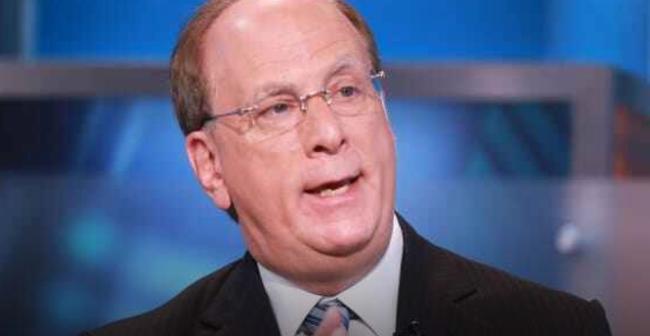Larry Fink: Market Could Go Higher As "Fear Of The Future" Draws Flood Of Retail Money Tyler Durden Tue, 10/13/2020 - 11:40
BlackRock reported on Tusday that its total assets under management swelled to $7.8 trillion during Q3 even as Robinhood draws so many new millennial customers that it has prompted mutual fund dinosaurs to fret about an exodus of client money.
Of course, BlackRock's specialty is ETFs. Unlike mutual funds, ETFs trade intraday, giving millennial traders that non-stop rush of trading action that helps to feed their delusions of day-trading glory. BlackRock does that, and so much more the 'systemic importance of the asset manager/shadow bank was highlighted earleir this year by the Fed's decision to tap BR to execute purchases of corporate bond ETFs as part of the CBs' expanded stimulus program.
Largely thanks to his firm's success, BlackRock founder and CEO Larry Fink has morphed into a CNBC-lebrity, often joining the network's jornalists to comment on the financial trends of the day, or offer his personal view on where markets are headed.
But on Tuesday, with BlackRock's latest earnings haul fresh in the headlines, Fink was asked about how retail traders are transforming the asset-management industry. Ignoring the deep economic scarring endured by many, Fink replied that the outbreak is forcing people to rethink how they save and invest.
“Covid and the fear of the future has created probably a higher savings rate -- we have people focusing on the long term a little more,” Fink said during the post-earnings call with reporters and analysts. “It’s leading to more savings and more investing for the long term.”
As discount brokerages like Robinhood signed up hundreds of thousands of new customers, BlackRock reported flows into all of its business lines. Retail clients added a net $19.6 billion to BlackRock funds in the period. Buyers of BR's iShares exchange-traded funds, many of them retail investors but also institutions, took in a net $41.3 billion.
In an interview on CNBC that followed the call, Fink expounded on that point, perhaps without realizing that "FOMO" - or "fear of missing out" - has been an important factor driving markets for a long time.
"The pandemic actually has created that fear of the future, and the response is a higher savings rate in America, and a higher investment rate for the long-term," Fink said Tuesday during the CNBC interview.
The subtext is clear: to any retail traders watching, instead of throwing your money away on those Nikola calls, maybe think about plunking your tendies into a more staid benchmark-tracking offering from BlackRock at just 3 basis points a year.
According to the latest data, the savings rate in the US has plunged in recent months as we move further and further away from the late summer's fiscal cliff.
Fink added that this is a global phenomenon, and that retail investors are pouring money into markets in Asia, Europe and elsewhere. In fact, it's this very trend that has led BlackRock to believe that there's "even more upside" in the near-term for markets, as more desperate retail investors seek to parlay their meager earnings into more.
“I believe we still have more to go on the upside even in front of probably rising infection rates with Covid-19,” Fink said. “We have a strong conviction that the average investor still is under-invested, and they’re going to have to be putting more and more money to work over the coming months and maybe even years.”
In other words, there's still some juice to be squeezed from retail traders who, thanks to the advent of payment-for-order-flow no have an outsize impact on market swings.
Fink's image of the economy was predictably rosy: he confidently suggested that Congress would dole out another stimulus package after the election, and added that Fed stimulus will keep stocks elevated for the time being.
And when it comes to the influx of retail investors, they're not all going to Robinhood: Fink added that BlackRock has also seen more younger investors putting money to work in its marketplace.
"We are seeing a record amount of retail participation in the marketplace," Fink said, contending it was more than just novice day traders using online brokerages such as Robinhood. "Across the board, the average investor is putting more and more money to work, which is a good outcome. I do believe that pandemic actually has created that fear of the future and a response is now a higher savings rates in America, a higher investment rate for the long term."
As far as the long-term implications of the burgeoning federal debt, Fink asserted that investors shouldn't worry about that right now.
"Monetary policy...creates more income equality because monetary policy lifts financial assets, and it is really mostly the wealthy people who own all the financial assets, and that’s why fiscal stimulus is so important," Fink said.
“These deficits will matter some time in the future but it is not a problem for this moment,” Fink added. “I do believe the aggressive nature of central bank behavior is basically foretelling us that we should not worry about rising interest rates at this time so let’s focus on rebuilding our economy over the next year or so, and so we have a more broad-based economic growth for everyone."
This is the same man who just a few months ago acknowledged that the market might be getting a little ahead of itself, and once even expressed some discomfort with the Fed's debasement of the dollar.
We wonder: What happened?
Source: (CNBC)
http://dlvr.it/RjWb6K

No comments:
Post a Comment